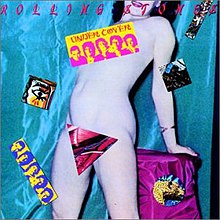
Back Undercover (album) Czech Undercover (album) Danish Undercover (Album) German Undercover (άλμπουμ) Greek Undercover (álbum) Spanish Undercover Finnish Undercover (album) French Undercover Croatian Undercover Hungarian Undercover (The Rolling Stones) Italian
This article needs additional citations for verification. (May 2021) |
| Undercover | ||||
|---|---|---|---|---|
 | ||||
| Studio album by | ||||
| Released | 7 November 1983 | |||
| Recorded | November 1982 – August 1983 | |||
| Studio |
| |||
| Genre | ||||
| Length | 44:46 | |||
| Label | Rolling Stones | |||
| Producer | The Glimmer Twins, Chris Kimsey | |||
| The Rolling Stones chronology | ||||
| ||||
| Singles from Undercover | ||||
| ||||
Undercover is the seventeenth studio album by English rock band the Rolling Stones, released on 7 November 1983 by Rolling Stones Records. The band would move the label to Columbia Records for its follow-up, 1986's Dirty Work.
After the band's preceding studio album Tattoo You (1981) was mostly patched together from a selection of outtakes, Undercover was their first release of all-new recordings in the 1980s. Tensions in the studio were high, as each of the principal songwriters wanted to take the band in a different direction. Vocalist Mick Jagger sought to adapt to modern trends in music, favouring reggae, worldbeat, and new wave musical textures, while guitarist Keith Richards wanted the band to return to their blues rock roots. As a result, the album is an eclectic collection of songs covering a wide range of styles. Besides the other principal band members, including guitarist Ronnie Wood, bassist Bill Wyman, and drummer Charlie Watts, the album featured many guest musicians. It would be the last album released during the lifetime of Ian Stewart, a former member of the band and frequent contributor on piano.
It would be the first Rolling Stones album in more than a decade to miss reaching No. 1 on the US albums chart, peaking at No. 4. Three singles were released from the album, with the highest-charting being top-40 release "Undercover of the Night".
- ^ "Quand les Rolling Stones s'éclataient à Boulogne-Billancourt". Archived from the original on 12 September 2020. Retrieved 26 April 2020.
- ^ Loder, Kurt (7 November 1983). "Undercover". Rolling Stone. Archived from the original on 31 July 2017. Retrieved 3 May 2021.
- ^ a b Erlewine, Stephen Thomas. "Undercover – The Rolling Stones". AllMusic. Archived from the original on 19 April 2021. Retrieved 3 May 2021.
- ^ "Chronicle 1983". Timeisonourside.com. Retrieved 7 November 2024.